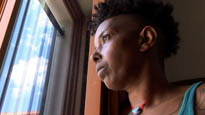My Freedom, Your Freedom isn’t an easy watch. In fact, it’s quite the opposite: it’s upsetting, uncomfortable, heartbreaking. But don’t let that turn you off of seeing it.
Separately following two women, Kübra and Salema, as they leave Lichtenberg Prison in Berlin and try to connect their newfound freedom to the caged lives they’d grown to know, My Freedom, Your Freedom takes an unflinching look at what prison means to Western society. The women speak freely to the camera, exposing some of their most heinous crimes and devastating tragedies. Subtitled (the subjects speak in German and Turkish), the film relies on the voices, expressions, and movements of Kübra and Salema to carry the narrative. And it works.
Kübra, a 22-year-old German of Kurdish descent who first went to jail at the age of 14, struggles with accepting the hard-to-swallow assault she committed on another inmate while in prison. Yet somehow she remains spirited and lively. When asked what she’ll do when she gets out of prison, she says she’ll probably have a drink because she’s not sure she can handle the freedom sober. Salema, a 41-year-old Ethiopian woman with an intense drug and alcohol problem, grapples with a haunting past she’d like to forget. One of the sorest scenes in the documentary shows Salema preparing heroin to inject into her veins while talking about how she should have gotten more from the dealer.
Director Diana Näcke presents Kübra and Salema at such raw, uninhibited moments that at times it’s hard to imagine the two women agreeing to be part of such an endeavour. Such honesty can only be chalked up to Näcke, and is clearly a testament to not only her filmmaking skills but also her compassion and trustworthiness as a journalist and a human. Throughout the film Kübra and Salema address Näcke directly, fondly calling her “Diana” and speaking to her like a friend. It becomes evident, towards the end of the film, that the two women did indeed view Näcke that way. While still an observer, she was not a fly on the wall; she was a part of their lives, a figure of consistency and stability in their otherwise crumbled lives.
The film also follows prison warden Matthias Bluemel as he struggles with the pros and cons of his institution. Day in and day out he watches these women in prison, unsure if what he is doing will in any way help them put the pieces of their shambled lives back together. At one point he says he wishes he could close the prison for a week and start over in an organized matter, addressing the issues from a fresh angle. But of course, as we know, life doesn’t work that way. You can’t just shut off your problems.
Perhaps the most spirit-crushing moment of the film comes near the end, when Salema is freshly out of prison but more lost than ever. She says that she can’t handle the freedom and that she doesn’t know what to do with it; she yells that she doesn’t want to exist anymore and breaks down in tears. It’s an incredibly moving scene that only a truly talented, open-minded, and strong-willed team of filmmakers would be able to witness and then share with others.
Throughout the film, as the two women reflect on their time in jail and experience the beginnings of life after it, we are left continuously asking ourselves: is this worth it? Does incarceration work, and more importantly, does it have a place in our society today? They are not easy questions to answer, to be sure. But it’s important to note that both Kübra and Salema, after a few months of struggling with their freedom, both end up back in jail.
My Freedom, Your Freedom
Sunday, April 29 at 9:30pm, TIFF Bell Lightbox. Buy tickets.
Wednesday, May 2 at 7:30pm, TIFF Bell Lightbox. Buy tickets.
~Sara Harowitz



 Follow Us On Instagram
Follow Us On Instagram
